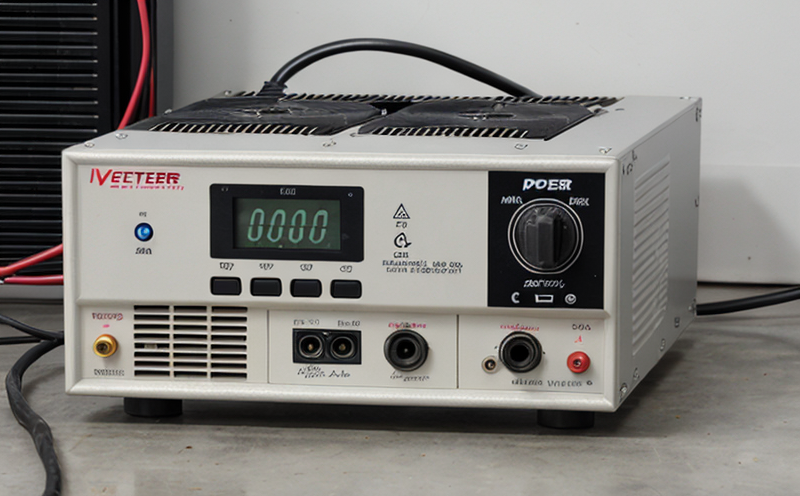UL 1741 Inverter Interconnection and Safety Testing
The UL 1741 Standard for Grid-Connected Inverters has become a cornerstone in ensuring safety, reliability, and efficiency of inverters used in renewable energy systems. This standard is critical for manufacturers, installers, and utility companies as it sets the benchmarks for interconnection and operational performance of inverters into electrical grids.
Our UL 1741 Inverter Interconnection and Safety Testing service ensures that all products comply with this stringent standard, thereby minimizing risks associated with grid integration. This involves a comprehensive suite of tests designed to evaluate various aspects such as power quality, fault ride-through capability, and protection against overcurrent conditions.
Testing begins with initial product evaluation where the inverter's design is assessed for compliance with UL 1741 requirements. The testing process then proceeds through several stages including but not limited to:
- Functional testing of all specified control functions
- Interconnection performance and safety checks
- Power quality analysis
- Fault ride-through verification
- Protection against overcurrent conditions
- Standby power monitoring and reporting
The UL 1741 standard emphasizes the need for inverters to function seamlessly with utility grids, ensuring that they are capable of operating under a variety of conditions. This includes situations where the grid experiences faults or disturbances. Our testing facilities employ state-of-the-art equipment and software to simulate real-world scenarios accurately.
Compliance with UL 1741 is essential for businesses in the renewable energy sector as it directly impacts their ability to operate safely within utility grids. By adhering to these standards, companies can ensure their products are reliable, safe, and efficient, thus enhancing customer trust and regulatory compliance.
The testing process involves rigorous validation of each inverter model against specific criteria outlined by UL 1741. This includes evaluating the inverter's ability to operate within specified voltage, frequency, and power factor ranges. Additionally, tests are conducted to ensure that the device can safely disconnect from the grid during faults or when requested by utilities.
Our team of experts ensures that every aspect of the testing process is meticulously documented. This documentation serves as a critical reference for future audits and product improvements. By providing detailed reports on test results, we help manufacturers identify areas for improvement and enhance their products' performance.
Compliance with UL 1741 not only enhances safety but also promotes interoperability between different components of the renewable energy system. This is particularly important as more systems incorporate multiple types of inverters and other power electronics devices. Our testing ensures that these components work harmoniously, contributing to a stable and efficient grid.
In summary, our UL 1741 Inverter Interconnection and Safety Testing service plays a pivotal role in ensuring the safety and reliability of grid-connected renewable energy systems. By adhering to this standard, manufacturers can confidently enter the global market while meeting stringent regulatory requirements.
Why It Matters
The importance of UL 1741 compliance cannot be overstated in today's rapidly growing renewable energy sector. The standard addresses critical issues related to grid integration and safety, which are paramount for the success of any renewable energy project.
Firstly, it ensures that inverters can safely interconnect with electrical grids, which is essential for the smooth operation of renewable energy systems. Inverters play a crucial role in converting solar or wind power into usable electricity, but this conversion process must be done without causing harm to the grid or endangering utility workers.
Secondly, compliance helps mitigate risks associated with overcurrent conditions and faults within the grid. By ensuring that inverters can safely disconnect from the grid during such events, utilities can avoid costly outages and potential hazards for personnel. This is particularly important in regions prone to severe weather events or where grids are subject to frequent disturbances.
Thirdly, UL 1741 promotes interoperability between different components of renewable energy systems. As more solar and wind projects incorporate multiple types of inverters and other power electronics devices, the ability for these components to work harmoniously is crucial. Compliance with this standard ensures that all parts operate efficiently within a single system, enhancing overall performance and reliability.
Finally, compliance also enhances customer trust in renewable energy products. As more consumers turn to green energy solutions, they seek assurance that the equipment they purchase is safe and reliable. By adhering to UL 1741 standards, manufacturers can build this confidence, fostering greater adoption of renewable technologies.
Applied Standards
| Standard | Description |
|---|---|
| UL 1741 | Grid-Connected Inverters and Energy Storage Systems: Interconnection Requirements, Safety, Performance, and Harmonization |
| IEC 62109 | Performance and Grid Interface Characteristics of Grid-Connected Power Electronics Converters |
| EN 50530 | Power Quality for Interconnected Distributed Generation Systems |
| ASTM E2647 | Safety Requirements for Grid Connected Inverters and Energy Storage Systems |
The UL 1741 standard is integral to our testing process, ensuring that all inverters meet the highest safety and performance standards. Additionally, we reference other international standards such as IEC 62109, EN 50530, and ASTM E2647 for further validation of test results.
Benefits
- Enhanced Safety: Ensures compliance with rigorous safety standards to protect both personnel and the grid.
- Improved Interoperability: Facilitates seamless integration of renewable energy systems, promoting efficient operation.
- Regulatory Compliance: Helps manufacturers meet stringent regulatory requirements, ensuring smooth market entry.
- Increased Customer Trust: Builds confidence in the reliability and safety of products, fostering greater adoption.
- Enhanced Product Performance: Identifies areas for improvement through detailed test results, leading to enhanced product performance.
- Cost Savings: By preventing costly errors or failures during deployment, compliance reduces long-term operational costs.
Our UL 1741 Inverter Interconnection and Safety Testing service provides comprehensive support for manufacturers looking to ensure their products meet these critical standards. This not only enhances the safety and reliability of renewable energy systems but also promotes broader adoption of green technologies.





